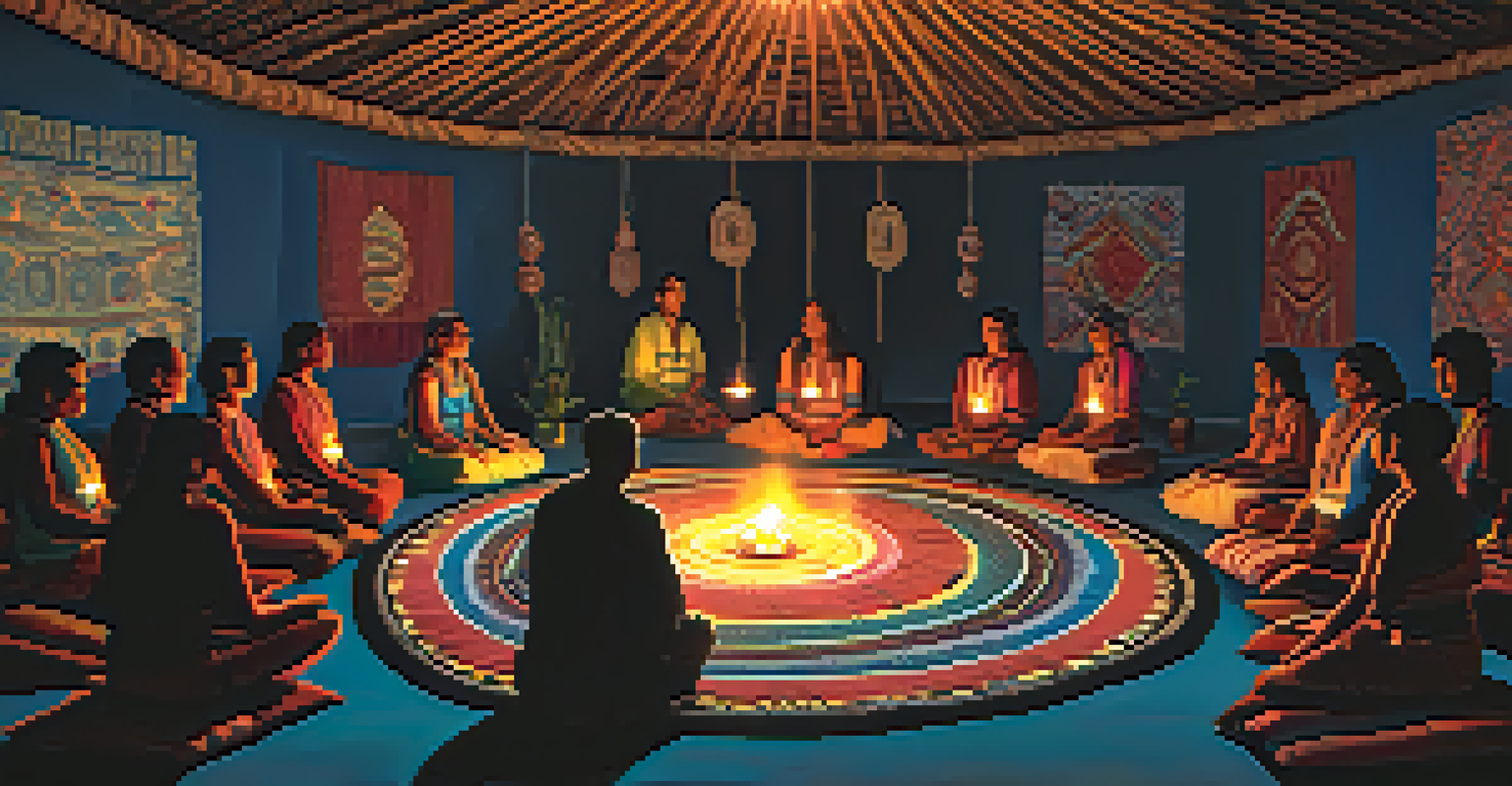Ayahuasca and Emotional Release: Healing Trauma's Burden

Understanding Ayahuasca: A Brief Overview
Ayahuasca is a powerful brew made from the Banisteriopsis caapi vine and other plants, traditionally used in South American shamanic practices. This ancient medicinal drink is known for its psychoactive properties, primarily due to the presence of DMT, a compound that can induce intense spiritual experiences. People often seek Ayahuasca for its potential to facilitate deep emotional healing and self-discovery.
The wound is the place where the Light enters you.
The experience often involves vivid visions, emotional catharsis, and profound insights, which can help individuals confront their traumas. Unlike conventional therapies that focus on discussing issues, Ayahuasca journeys can bring buried emotions to the surface in a powerful way. This unique approach allows individuals to process their feelings and experiences on a deeper level.
As the popularity of Ayahuasca grows beyond its traditional roots, it's important to approach it with respect and caution. Many participants report life-changing transformations, yet the experience can also be challenging. Understanding the nature of Ayahuasca sets the stage for exploring its impact on emotional release and trauma healing.
The Connection Between Trauma and Emotional Burdens
Trauma can leave deep emotional scars, manifesting as anxiety, depression, or even physical ailments. These burdens often stem from past experiences that are too painful or overwhelming to confront. When left unaddressed, they can lead to a cycle of suffering that affects every aspect of life, from relationships to self-esteem.

Emotional burdens can sometimes feel like a heavy backpack we carry around, filled with rocks of unresolved pain and hurt. Just as a hiker would lighten their load to enjoy the journey, releasing these emotional weights can lead to a more fulfilling life. The challenge is often in recognizing and addressing these burdens, which brings us to the potential of Ayahuasca.
Ayahuasca Aids Emotional Healing
Ayahuasca facilitates deep emotional release, helping individuals confront traumas and uncover buried feelings.
Many individuals find that Ayahuasca provides a safe space to confront and release these emotional burdens. The brew’s effects can facilitate a deep introspection, allowing people to finally face the traumas they’ve been avoiding. This process of emotional release is crucial for healing and moving forward.
How Ayahuasca Facilitates Emotional Release
During an Ayahuasca ceremony, the combination of the brew and the supportive environment creates a unique setting for emotional release. Participants often experience intense feelings, which can lead to cathartic crying or even laughter, helping to express what has been bottled up for years. This emotional purge is an essential component of the healing process.
Healing takes time, and asking for help is a courageous step.
The visions and insights gained during the experience can provide clarity and understanding, revealing the root causes of emotional pain. For many, this epiphany can be transformative, allowing them to let go of feelings they didn't even realize they were carrying. It's akin to clearing out a cluttered attic, where once-hidden memories and emotions come to light.
Moreover, the communal aspect of these ceremonies can foster a sense of connection and support among participants. Sharing experiences with others who are on similar healing journeys can create a profound sense of belonging, reducing feelings of isolation. This supportive environment enhances the emotional release process, making it even more impactful.
Personal Stories of Healing Through Ayahuasca
Many individuals have shared their transformative experiences with Ayahuasca, recounting how the brew helped them confront deep-seated traumas. For instance, a woman might share how she faced the grief of losing a loved one, allowing her to finally mourn and begin healing. These personal stories often highlight the profound emotional releases that many participants experience.
Another common narrative includes individuals who have struggled with addiction, revealing how Ayahuasca facilitated their journey towards recovery. The emotional insights gained during the ceremony often serve as a catalyst for change, helping them to understand the underlying pain driving their addictive behaviors. These transformations can be incredibly inspiring for those considering this path.
Integration is Key After Ceremony
Post-ceremony integration through journaling and community support is crucial for maintaining the healing benefits of Ayahuasca.
These stories serve as a testament to the healing potential of Ayahuasca, showcasing its ability to guide individuals through their darkest moments. While every experience is unique, the common thread of emotional release and healing resonates deeply among participants. It emphasizes the importance of sharing these journeys to foster connection and understanding.
Potential Risks and Considerations
While Ayahuasca can offer profound healing, it's essential to approach it with caution and awareness of potential risks. The intensity of the experience can be overwhelming for some individuals, leading to psychological distress or triggering unresolved trauma. It's crucial to consider one's mental health history and consult with professionals before embarking on this journey.
Another consideration is the setting in which Ayahuasca is consumed. Attending a well-facilitated ceremony led by experienced guides is vital for ensuring safety and maximizing the healing potential. A supportive environment helps participants navigate the emotional waves that may arise during the experience.
Lastly, it’s important to manage expectations. While many people experience significant emotional release, not every journey will be life-changing. Understanding that healing is a personal process can reduce pressure and allow participants to embrace whatever comes up during their experience.
Integrating the Ayahuasca Experience for Lasting Change
After an Ayahuasca ceremony, the journey doesn't end; in fact, it's just the beginning of a new chapter. Integrating the insights and emotional releases experienced during the ceremony is crucial for lasting change. Participants often find that journaling, therapy, or community support helps them process and apply what they've learned.
It's similar to returning home after a trip abroad; the experiences may have changed you, but it’s up to you to incorporate those changes into your daily life. Setting intentions for personal growth and actively working towards them can help sustain the emotional healing initiated during the ceremony. This ongoing reflection and action are key to maintaining the benefits of the experience.
Growing Interest in Ayahuasca Therapy
The increasing recognition of Ayahuasca's therapeutic potential highlights its evolving role in modern approaches to trauma healing.
Additionally, connecting with others who have undergone similar journeys can provide a sense of community and accountability. Sharing insights, struggles, and successes fosters an environment of support, helping individuals stay committed to their healing process. Ultimately, the integration phase is where the real transformation can take root.
The Future of Ayahuasca and Trauma Healing
As interest in Ayahuasca for emotional healing continues to grow, so does the conversation around its potential role in modern therapeutic practices. Researchers and mental health professionals are increasingly exploring the therapeutic benefits of psychedelics, including Ayahuasca, in treating trauma and emotional disorders. This shift could lead to a broader acceptance of such traditional practices in contemporary medicine.
Moreover, as more people share their positive experiences, the narrative surrounding Ayahuasca is evolving. It’s moving from a niche spiritual practice to a recognized option for those seeking emotional healing. This opens the door for more research, education, and understanding of the brew's potential.

However, with this growth comes the responsibility to ensure ethical practices and respect for the cultures that have long used Ayahuasca. It’s vital that as we embrace these healing traditions, we do so with humility and an understanding of their origins. The future of Ayahuasca in trauma healing hinges on this balance of respect, research, and openness to new possibilities.